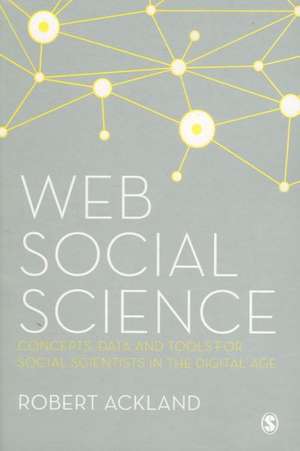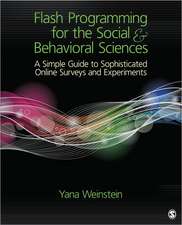Web Social Science: Concepts, Data and Tools for Social Scientists in the Digital Age
Autor Robert Acklanden Limba Engleză Paperback – 16 iun 2013
- Paul Vogt, Illinois State University
"This book brings the art and science of building and applying innovative online research tools to students and faculty across the social sciences."
- William H. Dutton, University of Oxford
A comprehensive guide to the theory and practice of web Social Science. This book demonstrates how the web is being used to collect social research data, such as online surveys and interviews, as well as digital trace data from social media environments, such as Facebook and Twitter. It also illuminates how the advent of the web has led to traditional social science concepts and approaches being combined with those from other scientific disciplines, leading to new insights into social, political and economic behaviour. Situating social sciences in the digital age, this book aids:
- understanding of the fundamental changes to society, politics and the economy that have resulted from the advent of the web
- choice of appropriate data, tools and research methods for conducting research using web data
- learning how web data are providing new insights into long-standing social science research questions
- appreciation of how social science can facilitate an understanding of life in the digital age
Preț: 418.13 lei
Nou
Puncte Express: 627
Preț estimativ în valută:
80.03€ • 86.96$ • 67.27£
80.03€ • 86.96$ • 67.27£
Carte tipărită la comandă
Livrare economică 21 aprilie-05 mai
Preluare comenzi: 021 569.72.76
Specificații
ISBN-13: 9781849204828
ISBN-10: 1849204829
Pagini: 224
Ilustrații: black & white illustrations, black & white line drawings, black & white tables, figures
Dimensiuni: 156 x 234 x 12 mm
Greutate: 0.34 kg
Ediția:1
Editura: SAGE Publications
Colecția Sage Publications Ltd
Locul publicării:London, United Kingdom
ISBN-10: 1849204829
Pagini: 224
Ilustrații: black & white illustrations, black & white line drawings, black & white tables, figures
Dimensiuni: 156 x 234 x 12 mm
Greutate: 0.34 kg
Ediția:1
Editura: SAGE Publications
Colecția Sage Publications Ltd
Locul publicării:London, United Kingdom
Recenzii
Ackland's Web Social Science is unique in being specifically designed for social science researchers. Although written simply enough to be accessible to undergraduates, accomplished scholars are likely to appreciate it too. Reading it taught me quite a lot about a subject I thought I knew rather well.
A rare and timely entry to the growing body of quantitative Internet research. While most other works on the topic are written by and for scientists, this book represents a social science approach that is more accessible and applicable, with more attention to preparation, processing and interpretation of real-world data. Though primarily for readers in social science, business studies, policy analysts, and alike, the book blends traditional social science and emerging web science into a unique handbook of Internet research.
Brings the art and science of building and applying innovative online research tools to students and faculty across the social sciences.
Provides excellent chapters on how to study the Web from a social science research perspective. Although there are many books on theorizing the Internet and the Web, few tackle hands-on research issues. This two-part book (divided into a methods section and example studies) covers a wide range of research designs, tools and data types from many different social science perspectives (psychology, sociology, media studies, political studies and network science among others). Highly recommended for social science studies that want to use the Web to study social phenomena (the Web as a tool) and media studies that focus on the Web itself as a research object.
This book combines the technical terms with the social science perspective and some important topics in daily life related to private life, organisational, political and economic activities. It is appropriate for scientists and students in different areas – social, engineering, economic – every area that uses web for informing, promoting, exerting social influence and conducting studies.
The benefit-and the challenge- of this ambitious volume is that the author considers not only how web data are providing new insights into existing social science research questions, but also how social science can contribute to an understanding of life in the digital era...Overall, Ackland has much to offer researchers seeking to conduct Web social science research: in both the methods section and a section composed of concrete, useful examples, he examines varied research designs, tools and data types from diverse social science perspectives. Summing Up: Recommended. Graduate students and research/faculty.
As a relative novice to web-based social research, I have been searching for a book that explains the concepts and different methodologies in accessible language; gives examples demonstrating the practical application of web methods; and does not neglect academic rigour and ethics. This one ticks all those boxes…Ackland’s book is comprehensive and, despite the technical topic, easy to read and understand. The book is particularly valuable for those new to web social science, while it will serve as a handy reference for those with experience in the field.
An innovative book that is helpful for understanding new research questions on the impact of online networks and Internet use. This book can easily convince the reader of the importance of Internet-related research topics [and] it is a textbook that all students in social sciences would be able to read.
A rare and timely entry to the growing body of quantitative Internet research. While most other works on the topic are written by and for scientists, this book represents a social science approach that is more accessible and applicable, with more attention to preparation, processing and interpretation of real-world data. Though primarily for readers in social science, business studies, policy analysts, and alike, the book blends traditional social science and emerging web science into a unique handbook of Internet research.
Brings the art and science of building and applying innovative online research tools to students and faculty across the social sciences.
Provides excellent chapters on how to study the Web from a social science research perspective. Although there are many books on theorizing the Internet and the Web, few tackle hands-on research issues. This two-part book (divided into a methods section and example studies) covers a wide range of research designs, tools and data types from many different social science perspectives (psychology, sociology, media studies, political studies and network science among others). Highly recommended for social science studies that want to use the Web to study social phenomena (the Web as a tool) and media studies that focus on the Web itself as a research object.
This book combines the technical terms with the social science perspective and some important topics in daily life related to private life, organisational, political and economic activities. It is appropriate for scientists and students in different areas – social, engineering, economic – every area that uses web for informing, promoting, exerting social influence and conducting studies.
The benefit-and the challenge- of this ambitious volume is that the author considers not only how web data are providing new insights into existing social science research questions, but also how social science can contribute to an understanding of life in the digital era...Overall, Ackland has much to offer researchers seeking to conduct Web social science research: in both the methods section and a section composed of concrete, useful examples, he examines varied research designs, tools and data types from diverse social science perspectives. Summing Up: Recommended. Graduate students and research/faculty.
As a relative novice to web-based social research, I have been searching for a book that explains the concepts and different methodologies in accessible language; gives examples demonstrating the practical application of web methods; and does not neglect academic rigour and ethics. This one ticks all those boxes…Ackland’s book is comprehensive and, despite the technical topic, easy to read and understand. The book is particularly valuable for those new to web social science, while it will serve as a handy reference for those with experience in the field.
An innovative book that is helpful for understanding new research questions on the impact of online networks and Internet use. This book can easily convince the reader of the importance of Internet-related research topics [and] it is a textbook that all students in social sciences would be able to read.
Cuprins
Chapter 1. Introduction
PART ONE: WEB SOCIAL SCIENCE METHODS
Chapter 2. Online Research Methods
Dimensions and Modes of Online Research
Online Surveys
Online Interviews and Focus Groups
Web Content Analysis
Social Media Network Analysis
Online Experiments
Online Field Research
Digital Trace Data: Ethics
Chapter 3. Social Media Networks
Social Networks: Concepts and Definitions
Social Network Analysis
Social Media Networks
Social Networks, Information Networks and Communication Networks
SNA Metrics for the Example School Friendship Network (advanced)
Chapter 4. Hyperlink Networks
Hyperlink Networks: Background
Three Disciplinary Perspectives on Hyperlink Networks
Tools for Hyperlink Network Research
PART TWO: WEB SOCIAL SCIENCE EXAMPLES
Chapter 5. Friendship Formation and Social Influence
Homophily in Friendship Formation
Social Influence
Chapter 6. Organisational Collective Behaviour
Collective Behaviour on the Web: Background
Collective Action and Public Goods
Networked Social Movements
Chapter 7. Politics and Participation
Visibility of Political Information
Social and Political Engagement
Political Homophily
An Introduction to Power Laws (advanced)
Chapter 8. Government and Public Policy
Delivery of Information to Citizens
Government Authority
Public Policy Modelling
Chapter 9. Production and Collaboration
Peer Production and Information Public Goods
Scholarly Activity and Communication
Network Structure and Achievement
Chapter 10. Commerce and Marketing
Distribution of Product Sales
Influence in Markets
PART ONE: WEB SOCIAL SCIENCE METHODS
Chapter 2. Online Research Methods
Dimensions and Modes of Online Research
Online Surveys
Online Interviews and Focus Groups
Web Content Analysis
Social Media Network Analysis
Online Experiments
Online Field Research
Digital Trace Data: Ethics
Chapter 3. Social Media Networks
Social Networks: Concepts and Definitions
Social Network Analysis
Social Media Networks
Social Networks, Information Networks and Communication Networks
SNA Metrics for the Example School Friendship Network (advanced)
Chapter 4. Hyperlink Networks
Hyperlink Networks: Background
Three Disciplinary Perspectives on Hyperlink Networks
Tools for Hyperlink Network Research
PART TWO: WEB SOCIAL SCIENCE EXAMPLES
Chapter 5. Friendship Formation and Social Influence
Homophily in Friendship Formation
Social Influence
Chapter 6. Organisational Collective Behaviour
Collective Behaviour on the Web: Background
Collective Action and Public Goods
Networked Social Movements
Chapter 7. Politics and Participation
Visibility of Political Information
Social and Political Engagement
Political Homophily
An Introduction to Power Laws (advanced)
Chapter 8. Government and Public Policy
Delivery of Information to Citizens
Government Authority
Public Policy Modelling
Chapter 9. Production and Collaboration
Peer Production and Information Public Goods
Scholarly Activity and Communication
Network Structure and Achievement
Chapter 10. Commerce and Marketing
Distribution of Product Sales
Influence in Markets
Notă biografică
Descriere
Explaining how the Web is a socially constructed phenomenon, this timely text provides readers with a complete theoretical and practical guide to Web Social Science






